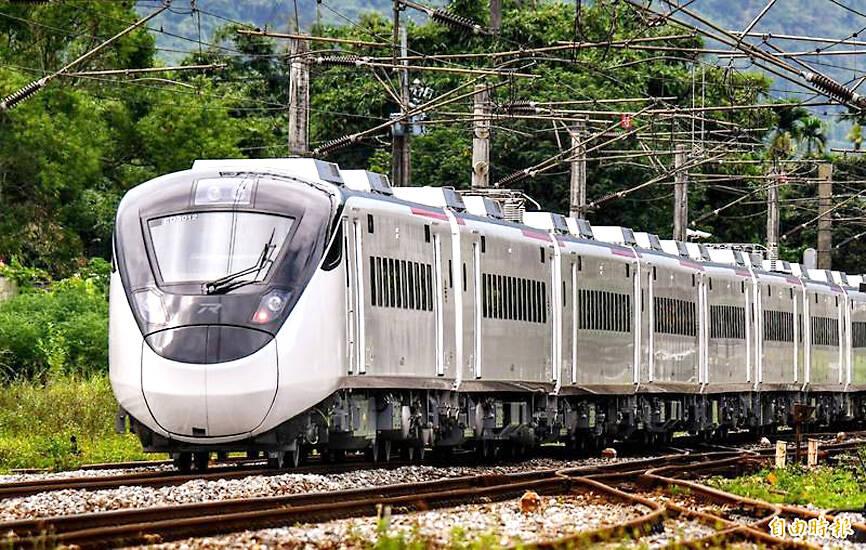Taiwan High-Speed Rail Corp (THSRC) and Taiwan Railway Corp (TRC) are to run additional trains during next year's Lunar New Year holiday, the companies announced.
The Lunar New Year transportation period will last 12 days from Jan. 23 to Feb 3.
THSRC is scheduling 368 additional trains, with 200 heading southbound and 168 going northbound, resulting in a total of 2,246 scheduled trains.

Photo: Cheng Wei-chi, Taipei Times
From midnight on Thursday, passengers can reserve tickets through the T-EX mobile ticketing app, THSRC’s partner convenience stores, the company’s website, and ticket counters and vending machines inside stations.
The company announced extra late-night trains, which arrive at end stations after midnight, as well as early departing trains that leave their starting stations at 5:30am, although the company did add that passengers using such trains should make plans in advance for transportation to or from the stations.
All trains will have two to eight non-reserved seating cars, it said.
The company also said that passengers with regular tickets during the 12 days of the Lunar New Year holiday will have access to non-reserved seats and have their validity period extended by nine days.
This means that a regular 30-day pass expiring on Feb. 18 can be extended to Feb. 27, for example.
TRC announced it would operate 302 extra trains around the country, with bookings for numbered trains on eastern routes to open on Thursday midnight and for western routes on Friday at midnight.
Reservations for real-name trains on the Eastern Line will be made available Saturday at midnight for residents in Hualien and Taitung counties or those whose national ID numbers begin with a “U” or “V.”
TRC also announced that for the Lunar New Year travel period, it will suspend sales of family car tickets and sell them as regular seating instead.

Civil society groups yesterday protested outside the Legislative Yuan, decrying Chinese Nationalist Party (KMT) efforts to pass three major bills that they said would seriously harm Taiwan’s democracy, and called to oust KMT caucus whip Fu Kun-chi (傅?萁). It was the second night of the three-day “Bluebird wintertime action” protests in Taipei, with organizers announcing that 8,000 people attended. Organized by Taiwan Citizen Front, the Economic Democracy Union (EDU) and a coalition of civil groups, about 6,000 people began a demonstration in front of KMT party headquarters in Taipei on Wednesday, organizers said. For the third day, the organizers asked people to assemble

POOR IMPLEMENTATION: Teachers welcomed the suspension, saying that the scheme disrupted school schedules, quality of learning and the milk market A policy to offer free milk to all school-age children nationwide is to be suspended next year due to multiple problems arising from implementation of the policy, the Executive Yuan announced yesterday. The policy was designed to increase the calcium intake of school-age children in Taiwan by drinking milk, as more than 80 percent drink less than 240ml per day. The recommended amount is 480ml. It was also implemented to help Taiwanese dairy farmers counter competition from fresh milk produced in New Zealand, which is to be imported to Taiwan tariff-free next year when the Agreement Between New Zealand and

A woman who allegedly spiked the food and drinks of an Australian man with rat poison, leaving him in intensive care, has been charged with attempted murder, the Taipei District Prosecutors’ Office said yesterday. The woman, identified by her surname Yang (楊), is accused of repeatedly poisoning Alex Shorey over the course of several months last year to prevent the Australian man from leaving Taiwan, prosecutors said in a statement. Shorey was evacuated back to Australia on May 3 last year after being admitted to intensive care in Taiwan. According to prosecutors, Yang put bromadiolone, a rodenticide that prevents blood from

A Japanese space rocket carrying a Taiwanese satellite blasted off yesterday, but was later seen spiraling downward in the distance as the company said the launch attempt had failed. It was the second attempt by the Japanese start-up Space One to become the country’s first private firm to put a satellite into orbit, after its first try in March ended in a mid-air explosion. This time, its solid-fuel Kairos rocket had been carrying five satellites, including one from the Taiwan Space Agency and others designed by Japanese students and corporate ventures. Spectators gathered near the company’s coastal Spaceport Kii launch pad in Japan’s